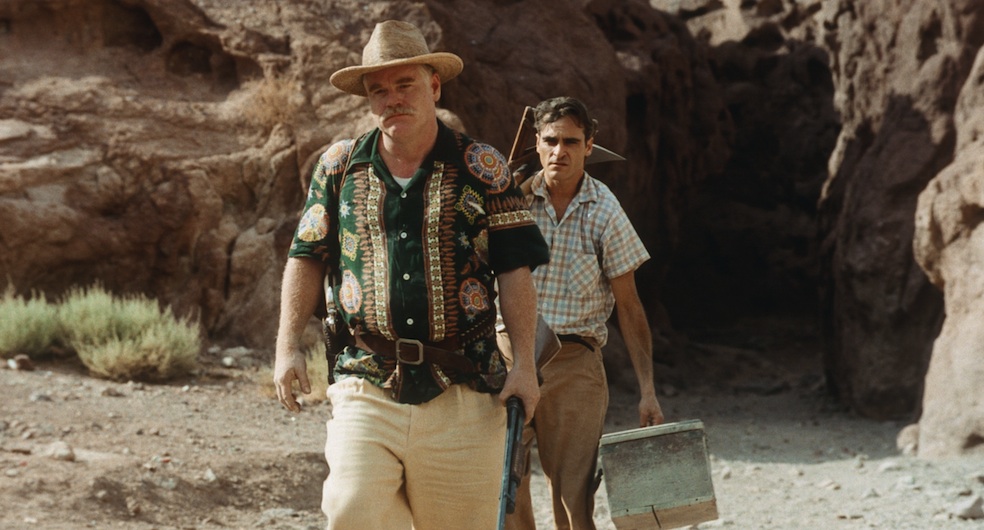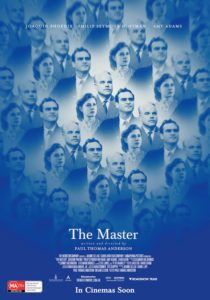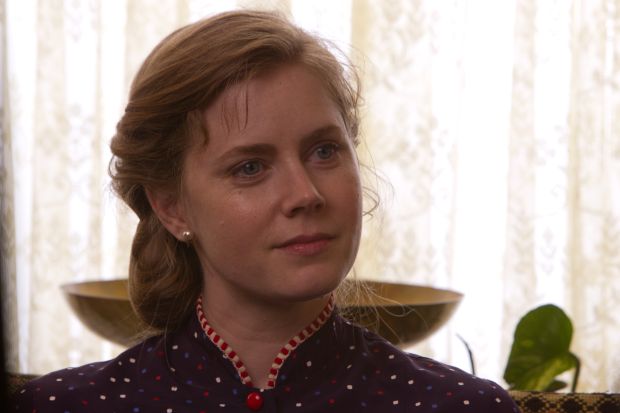Paul Thomas Anderson’s latest is a thinly veiled, and thinly plotted, examination of the forces around Scientology.
Director: Paul Thomas Anderson
Writer: Paul Thomas Anderson
Runtime: 137 minutes
Starring: Joaquin Phoenix, Philip Seymour Hoffman, Amy Adams
Distributor: Roadshow Films
Country: US
Rating (?): Wait for DVD/Blu-ray (★★½)
There is a moment in the opening scenes of The Master where the troubled Freddie Quell (Joaquin Phoenix) simulates sex on a model of a woman his navy buddies have made out of sand. It begins as a revealing moment to the viewer and amusing to the party, but rapidly becomes uncomfortable as Freddie takes it one step too far. The same could be said of Paul Thomas Anderson’s highly anticipated follow-up to his award winning There Will Be Blood (2007). Keen to replicate his previous successes in terms of scope and nuance, Anderson appears to have forgotten that his greatest strength is in the ensemble, here failing to imbue a talented cast of actors with any meaning beyond the superficial.
Following the end of the Second World War, Freddie suffers from post-traumatic stress syndrome, an issue not aided by his alcoholism. While we suspect that his trauma may go deeper than that, it is a chance encounter with the charismatic Lancaster Dodds (Philip Seymour Hoffman) and his wife Peggy (Amy Adams) that alters his destiny. Introducing Freddie to intense questioning known as Processing, Dodds is revealed to be a notable author of “The Cause”, a philosophical movement that is gaining its followers and detractors across America with its claims of being able to cure terminal diseases. With Freddie’s erratic and violent behaviour escalating, he soon clashes with the principals of the movement, and continues to be haunted by the demons of his past.
Just as Freddie becomes increasingly frustrated with the repetition and pointlessness of the exercises from “The Cause”, so too is Anderson’s film filled with agonisingly meandering moments. Never fully committed to its own cause, the film begins as a tale of a lost soul, drifting from one job to the next without direction or an ability to control his own rage. At times, Phoenix is completely incomprehensible, speaking out the side of his mouth in a painfully conscious performance, giving the audience every reason not to care one iota about him. The appearance of Dodds, not named for the first third of the film and simply referred to as ‘The Master’, electrifies the picture momentarily. A regular of Anderson’s ensembles, having appeared in four of his five previous outings, his move from supporting player to centre stage is reflective of his own rising star over the last decade or so of award-winning roles. Yet beyond pontifications and his own occasional bouts of semi-provoked rage, Dodds is as ill-defined as the philosophy of “The Cause”.
As a result of Dodd’s lack of definition, Freddie remains deliberately lost. The struggle between two opposing wills is clearly something that fascinates Anderson, have previously explored the dichotomy in There Will Be Blood with the incredibly detailed portrayals of Daniel Plainview (Daniel Day Lewis) and Eli Sunday (Paul Dano), and to a lesser extent the magnetic personality of T.J. Mackey in Magnolia (1999), played by arguably the world’s most famous Scientologist, Tom Cruise. Anderson is avoiding those looming questions around the wider impact of Scientology and other similar cults, even if the film is rooted in those obvious comparisons to the well-publicised teachings of science-fiction author L. Ron Hubbard. His focus on these particular characters leaves a substantial gap between Anderson’s understanding of what it is he is trying to say, and an accessible narrative for audiences. Anderson merely sets up the opposition between his leads, and they don’t so much clash as rub against each other in mild irritation. Indeed, far more interesting is the apparent true strength behind the throne, Lancaster’s wife Peggy, played with unwavering conviction by Adams, but sadly under-explored by Anderson.
The photography, originally shot for an intended 70mm projection, is at times stunning. The opening shots of the frothy trail of a boat as it cuts through open water serves as a powerful motif throughout the film. The Master‘s look is more in line with There Will Be Blood than his previous films, although it lacks the stunning vistas that gave that earlier film such a grand design. The photography is yet another element that fails to achieve any level of consistency, never transcending the often ugly nature of the subject matter. Mihai Malaimare Jr’s cinematography has been featured in Francis Ford Coppola’s films of the last few years, yet following the stunning mixture of digital imagery in Twixt, the photography here seems sub-par. Jonny Greenwood’s overbearing score is arresting from the start, reminding us of an impending doom that is already evident from Freddie’s behaviour, although often feels out of step with the shell of a narrative. A similar style worked for his previous collaboration with Anderson, yet here something like his slightly melancholic score for Norwegian Wood would have been the subtler approach
Much like L. Ron Hubbard’s children, Lancaster Dodd’s son Val (Jesse Plemons) doubts the legitimacy of his father’s cause. “He’s just making it up as he goes along,” he notes to an outraged Freddie. It is difficult not to feel that Anderson was doing the same thing with The Master, breaking us down with silent repetition until we have no choice but to take his film on face value. As a polemic on Scientology, or anything like it, Anderson doesn’t take a firm enough stance either way to suggest what the next step might be. Filled with indulgences during its bloated running time, including a incongruous scene where all the women of the room become suddenly naked, Anderson continues to prove that he is certainly an auteur with something to say, but hasn’t quite become a master.
The Master opened the Cockatoo Island Film Festival in Sydney in October 2012. It is released in Australia on 8 November 2012 from Roadshow Films.






